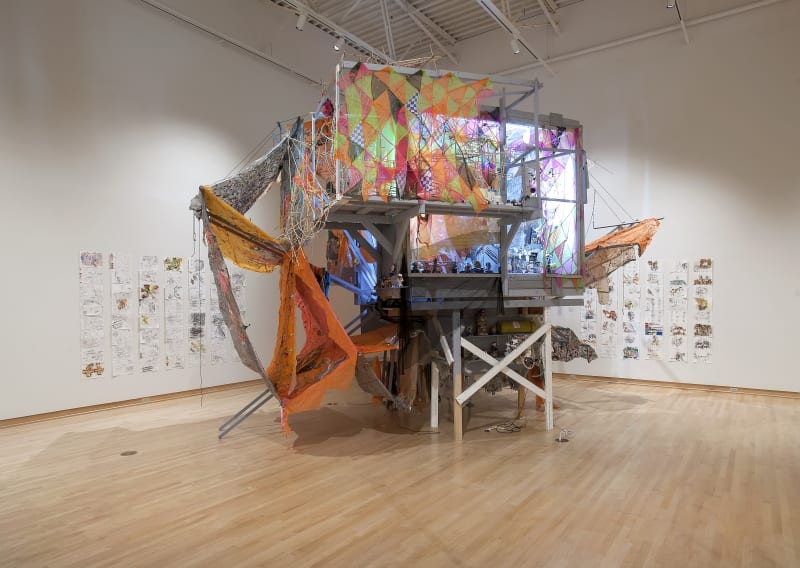The world needs better bureaucracies, and I aim to give it one. A bureaucracy that doubles down on its intrinsic, implacable, and compromised mystery. A bureaucracy that saves.
I know! I know! No one likes bureaucracy. It's at best a necessary evil, an unavoidable part of reality that seems to be ever-expanding. Experiences with it typically range from frustrating to devastating. But considering the current state of world affairs, I'll take procedures, forms, and bureaucrats over bias, money, and nationalism any day. My expectations, some might say, are wildly diminished. Perhaps. But I stumble toward an alternative—a beta version—for my seventh solo show at Susan Inglett Gallery, Garage Politburo.
Expect an imposing edifice, seals, insignias, busts, colors, forms, hanging files, and mugs. Expect lapel pins, banners, concrete, and stacks of manila folders. And there's "Tabletop Assumption," a video of drones and organizational charts. Bureaucracy and play: there is no alternative.
Throughout, imagined bureaucracies serve as inspiration: Psychoanalytic Placement Bureau (Fredric Jameson), Office of American Absorption (Philip Roth), Anti-Dishumanitarian League (Nisi Shawl), Central Services (the movie Brazil), Ministry of Plenty (George Orwell), and the Condolence Payment Department of the Joint Compensation Office (Omar El Akkad). Of course, the overwhelming mass and faceless authority of bureaucracy usually makes for grim portrayals, and rightfully so.
But I see an opening: technology has changed the game, once again democratizing what had required outsized resources. Blockchain technology brings bureaucracy creation to the people, opening up the possibility of making ministries that are particular, domestically scaled, or even boutique. And the accompanying markets (inescapable nowadays) are trivial to set up, all while maintaining a bureaucratic character. Rest assured, the familiar elements are present—forms, payment mechanisms, abstraction, data storage, and unforgiving procedures—but now everyone has the opportunity to tinker. Best of luck, for example, heading to Ethereum address 0x6B9d46a223fFa343f8b14D855A8314B0EfF7fcb7 to fill out FormSI060719 (Documentation at https://www.github.com/GaragePolitburo/SI060719).
This bureaucracy is but a germ, but it's complete and semi-functional. Here is a future, from the tabletop. Bureaucracy saves!
– Greg Smith
Greg Smith was born in DeKalb, Illinois. He lives and works in New York. Smith received an MFA from Hunter College, a PhD in Physics from Harvard University, and a BA from Amherst College. Garage Politburo premiered in Michelle Grabner’s “Makeshift” at the John Michael Kohler Arts Center early this year. Greg Smith has held solo exhibitions at the Museum of Fine Arts, St. Petersburg, FL; the McNay Art Museum, San Antonio, TX; Cress Gallery of Art, University of Tennessee, Chattanooga, TN; Faulconer Gallery, Grinnell College, IA; and White Columns, NYC. His work has been featured at MoMA, NYC; the Atlanta Contemporary Arts Center, Atlanta, GA; Artists Space, NYC; and the Weatherspoon Art Museum, Greensboro, NC, amongst others. Smith was awarded a Guggenheim Grant in 2013.

